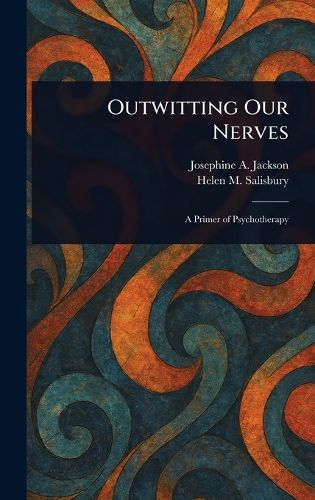Readings Newsletter
Become a Readings Member to make your shopping experience even easier.
Sign in or sign up for free!
You’re not far away from qualifying for FREE standard shipping within Australia
You’ve qualified for FREE standard shipping within Australia
The cart is loading…






This title is printed to order. This book may have been self-published. If so, we cannot guarantee the quality of the content. In the main most books will have gone through the editing process however some may not. We therefore suggest that you be aware of this before ordering this book. If in doubt check either the author or publisher’s details as we are unable to accept any returns unless they are faulty. Please contact us if you have any questions.
"Outwitting Our Nerves: A Primer of Psychotherapy" by Josephine A. Jackson and Helen M. Salisbury offers a timeless exploration of mental health and the power of suggestive therapy. This historical text delves into the principles of psychotherapy, providing insightful perspectives on managing nerves and fostering mental well-being.
Categorized under Philosophy & Psychology and addressing the subject of Therapeutics, Suggestive, this book serves as an accessible introduction to self-help strategies for understanding and addressing mental health concerns.
Drawing from the fields of psychotherapy and mental health, "Outwitting Our Nerves" presents guidance relevant to those interested in self-improvement and understanding the complexities of the human mind. A valuable resource for anyone seeking to explore the foundations of psychotherapy and its potential for positive change.
This work has been selected by scholars as being culturally important, and is part of the knowledge base of civilization as we know it.
This work is in the public domain in the United States of America, and possibly other nations. Within the United States, you may freely copy and distribute this work, as no entity (individual or corporate) has a copyright on the body of the work.
Scholars believe, and we concur, that this work is important enough to be preserved, reproduced, and made generally available to the public. We appreciate your support of the preservation process, and thank you for being an important part of keeping this knowledge alive and relevant.
$9.00 standard shipping within Australia
FREE standard shipping within Australia for orders over $100.00
Express & International shipping calculated at checkout
This title is printed to order. This book may have been self-published. If so, we cannot guarantee the quality of the content. In the main most books will have gone through the editing process however some may not. We therefore suggest that you be aware of this before ordering this book. If in doubt check either the author or publisher’s details as we are unable to accept any returns unless they are faulty. Please contact us if you have any questions.
"Outwitting Our Nerves: A Primer of Psychotherapy" by Josephine A. Jackson and Helen M. Salisbury offers a timeless exploration of mental health and the power of suggestive therapy. This historical text delves into the principles of psychotherapy, providing insightful perspectives on managing nerves and fostering mental well-being.
Categorized under Philosophy & Psychology and addressing the subject of Therapeutics, Suggestive, this book serves as an accessible introduction to self-help strategies for understanding and addressing mental health concerns.
Drawing from the fields of psychotherapy and mental health, "Outwitting Our Nerves" presents guidance relevant to those interested in self-improvement and understanding the complexities of the human mind. A valuable resource for anyone seeking to explore the foundations of psychotherapy and its potential for positive change.
This work has been selected by scholars as being culturally important, and is part of the knowledge base of civilization as we know it.
This work is in the public domain in the United States of America, and possibly other nations. Within the United States, you may freely copy and distribute this work, as no entity (individual or corporate) has a copyright on the body of the work.
Scholars believe, and we concur, that this work is important enough to be preserved, reproduced, and made generally available to the public. We appreciate your support of the preservation process, and thank you for being an important part of keeping this knowledge alive and relevant.